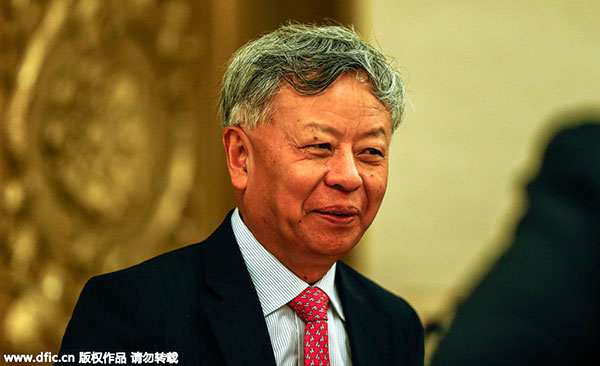AIIB's president candidate, scholarly economist
(Xinhua) Updated: 2015-07-07 16:48
 |
|
Jin Liqun smiles during the signing ceremony of memorandum of understanding on establishing the Asian Infrastructure Investment Bank (AIIB) in Beijing, October 24, 2014. [Photo/IC] |
BEIJING - China has formally nominated Jin Liqun, former vice finance minister of China, as its candidate for president of the Asian Infrastructure Investment Bank (AIIB), the Ministry of Finance announced Monday.
Jin, secretary-general of AIIB interim secretariat and former vice president of the Asian Development Bank (ADB), has spent the past few months shuttling between countries to convince them to join the bank.
But besides his financial and banking knowledge, Jin has impressed his colleagues with his love of literature, philosophy and English.
When he studied in Nanjing High School of Jiangyin, East China's Jiangsu province, from 1965 to 1968, Jin indulged in the third edition of Webster's New World Dictionary, a rare tome in schools at that time. "It was precious to me, while seldom used by my classmates," he recalled.
Now, a new edition of the dictionary has pride of place on his desk.
Also in senior high school, he read publications released by the imprint Zephyr Books. "The study was intense, but I took the time to read English books in the library," Jin Said.
The Cultural Revolution disrupted education and many young people in the city went to the countryside for "reeducation". Many attempted to continue with their academic pursuits while working the land, but only a few persisted.
Jin was one of them. He lived and worked in Changshu, Jiangsu Province, from 1968 to 1978, and his closest friends during that period were some of the works of Shakespeare given to him by his high school teacher.
Despite fulltime work in the fields, Jin's hunger for knowledge never tired.
He recalled this time of his life in a China Daily article: "Sometimes those curious, honest villagers would watch me. It seemed that they appreciated my hard effort."
After 10 years of a hard life in the countryside, Jin became one of the few high school graduates to bypass undergraduate studies, and was enrolled directly on to a postgraduate program majoring in British and American literature at Beijing Foreign Studies University (BFSU) in 1978.
His classmate Liu Runqing, now a professor at BFSU, recalls that Jin was the youngest and liveliest students in class.
"I have been engaged in economics and finance," Jin said. "But a huge part of my books are Chinese classical literature and philosophy."
- 2015 China International Fair for Investment and Trade kicks off in Xiamen
- China's commodity imports robust in Jan-Aug period
- China stocks rebound 2.92%
- 2015 China box office already past 2014 total
- China foreign trade decline widens in August
- Interview: JP Morgan's senior executive bullish on China
- Innovation, development the focus for NZ mayors
- Lives of freelancers

















